A Comparative Analysis of US and Ghana Elections: Political Culture
VerifiedAdded on 2023/06/04
|9
|2668
|379
Report
AI Summary
This research paper provides a comparative analysis of the function of political culture in the context of general elections in the United States and Ghana. The paper delves into the differences between the two countries' democratic systems, highlighting factors such as power transitions, voter turnout, and the influence of technology and voter education. It examines the historical backgrounds of both nations, discussing the impact of colonial legacies and the evolution of democratic principles. The study includes a literature review and empirical analysis, exploring how the conduct of elections and the level of political competition impact democratization. The paper emphasizes the importance of discussing election systems and democratic development, advocating for the embrace of democratic principles to foster growth. It provides a comprehensive overview of the two countries' political landscapes, offering insights into their respective journeys toward democratization.
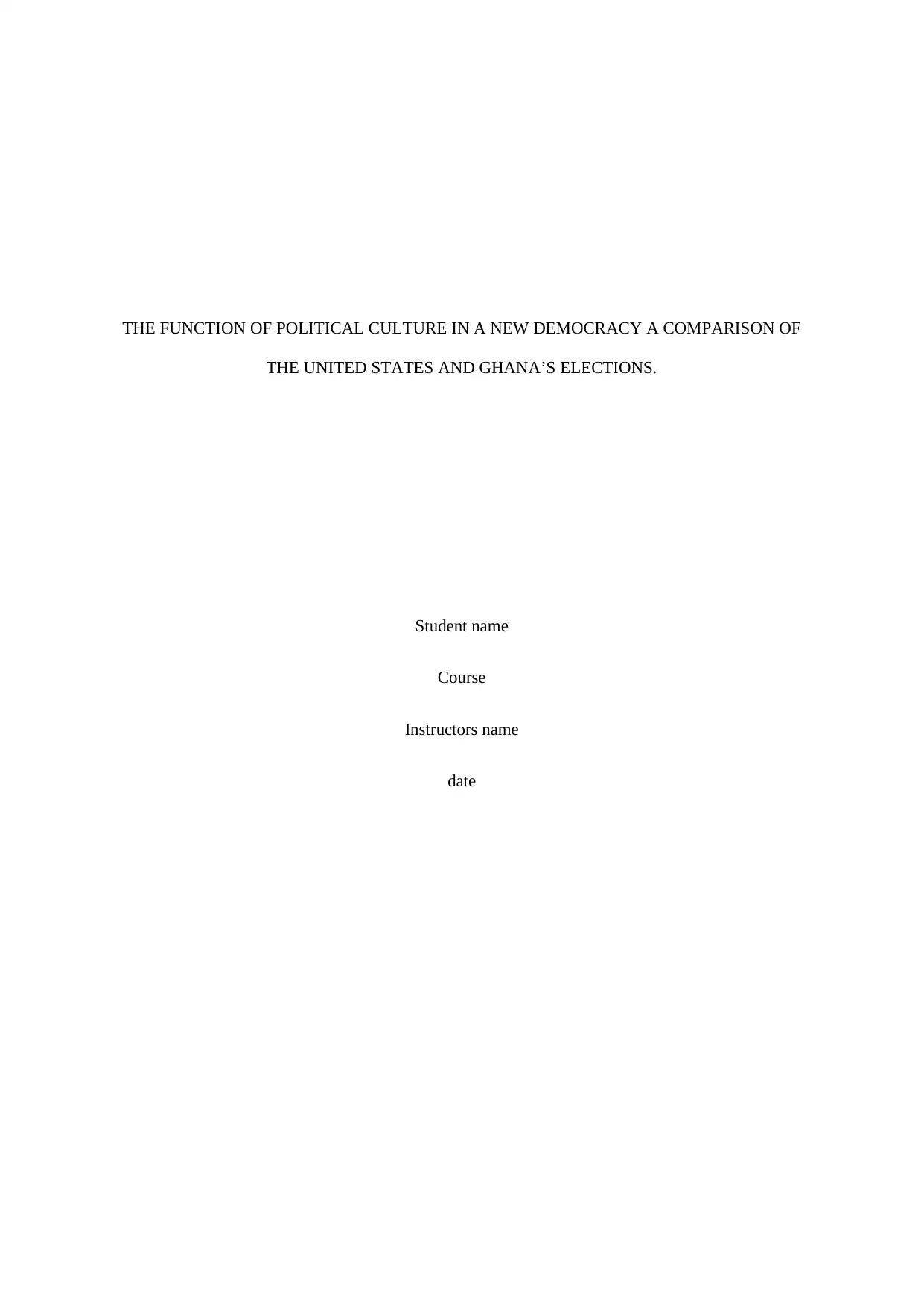
THE FUNCTION OF POLITICAL CULTURE IN A NEW DEMOCRACY A COMPARISON OF
THE UNITED STATES AND GHANA’S ELECTIONS.
Student name
Course
Instructors name
date
THE UNITED STATES AND GHANA’S ELECTIONS.
Student name
Course
Instructors name
date
Paraphrase This Document
Need a fresh take? Get an instant paraphrase of this document with our AI Paraphraser
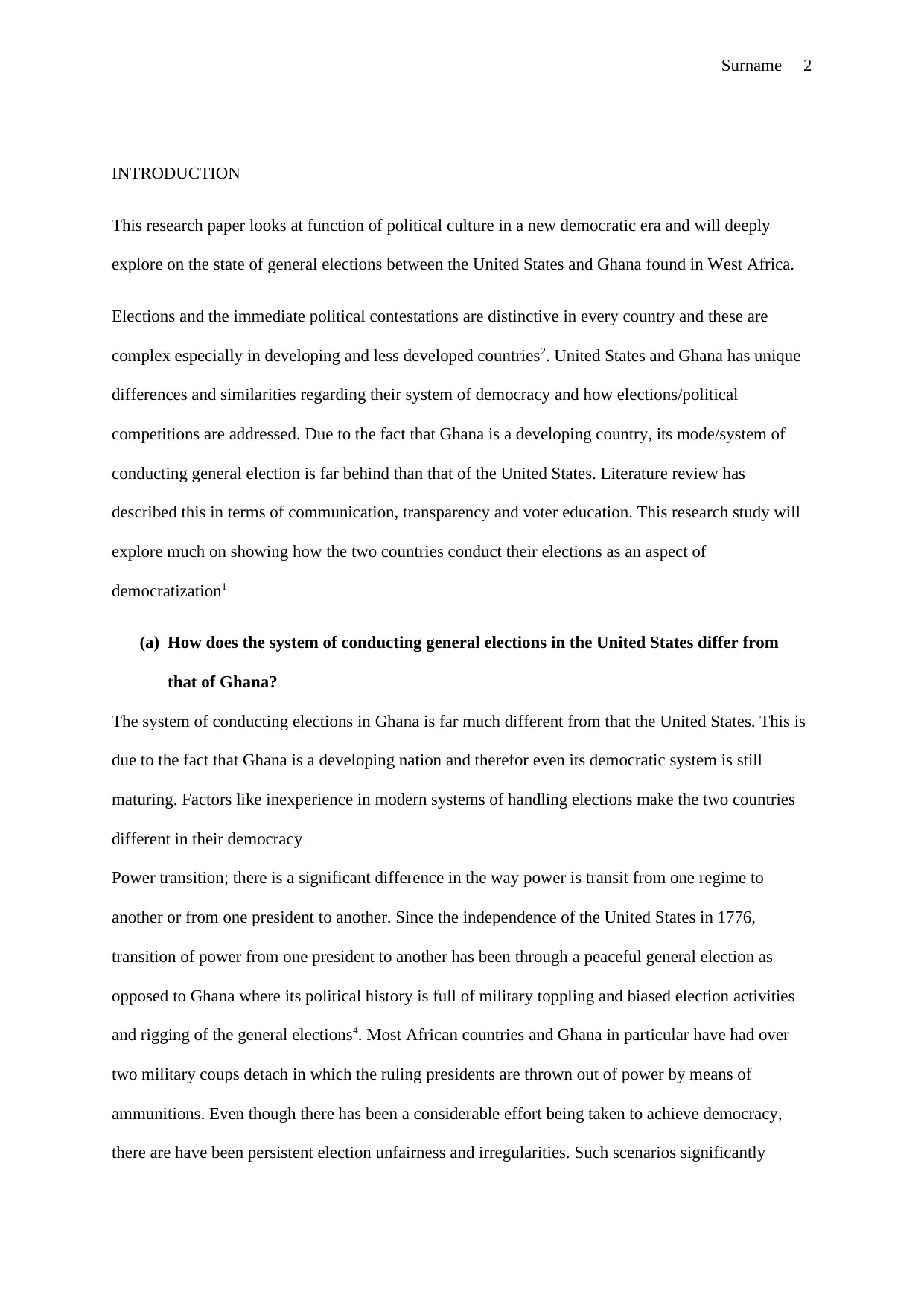
Surname 2
INTRODUCTION
This research paper looks at function of political culture in a new democratic era and will deeply
explore on the state of general elections between the United States and Ghana found in West Africa.
Elections and the immediate political contestations are distinctive in every country and these are
complex especially in developing and less developed countries2. United States and Ghana has unique
differences and similarities regarding their system of democracy and how elections/political
competitions are addressed. Due to the fact that Ghana is a developing country, its mode/system of
conducting general election is far behind than that of the United States. Literature review has
described this in terms of communication, transparency and voter education. This research study will
explore much on showing how the two countries conduct their elections as an aspect of
democratization1
(a) How does the system of conducting general elections in the United States differ from
that of Ghana?
The system of conducting elections in Ghana is far much different from that the United States. This is
due to the fact that Ghana is a developing nation and therefor even its democratic system is still
maturing. Factors like inexperience in modern systems of handling elections make the two countries
different in their democracy
Power transition; there is a significant difference in the way power is transit from one regime to
another or from one president to another. Since the independence of the United States in 1776,
transition of power from one president to another has been through a peaceful general election as
opposed to Ghana where its political history is full of military toppling and biased election activities
and rigging of the general elections4. Most African countries and Ghana in particular have had over
two military coups detach in which the ruling presidents are thrown out of power by means of
ammunitions. Even though there has been a considerable effort being taken to achieve democracy,
there are have been persistent election unfairness and irregularities. Such scenarios significantly
INTRODUCTION
This research paper looks at function of political culture in a new democratic era and will deeply
explore on the state of general elections between the United States and Ghana found in West Africa.
Elections and the immediate political contestations are distinctive in every country and these are
complex especially in developing and less developed countries2. United States and Ghana has unique
differences and similarities regarding their system of democracy and how elections/political
competitions are addressed. Due to the fact that Ghana is a developing country, its mode/system of
conducting general election is far behind than that of the United States. Literature review has
described this in terms of communication, transparency and voter education. This research study will
explore much on showing how the two countries conduct their elections as an aspect of
democratization1
(a) How does the system of conducting general elections in the United States differ from
that of Ghana?
The system of conducting elections in Ghana is far much different from that the United States. This is
due to the fact that Ghana is a developing nation and therefor even its democratic system is still
maturing. Factors like inexperience in modern systems of handling elections make the two countries
different in their democracy
Power transition; there is a significant difference in the way power is transit from one regime to
another or from one president to another. Since the independence of the United States in 1776,
transition of power from one president to another has been through a peaceful general election as
opposed to Ghana where its political history is full of military toppling and biased election activities
and rigging of the general elections4. Most African countries and Ghana in particular have had over
two military coups detach in which the ruling presidents are thrown out of power by means of
ammunitions. Even though there has been a considerable effort being taken to achieve democracy,
there are have been persistent election unfairness and irregularities. Such scenarios significantly
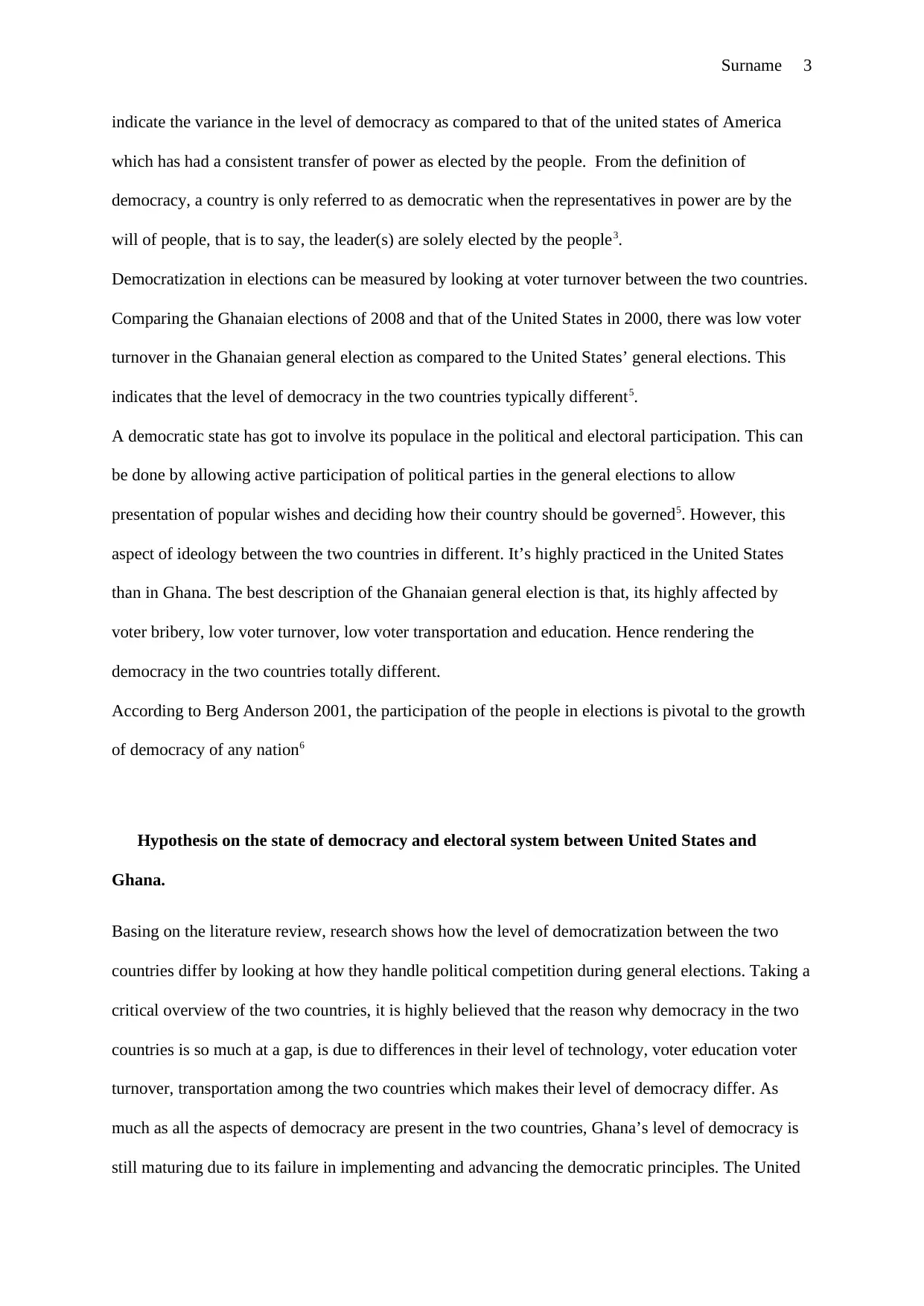
Surname 3
indicate the variance in the level of democracy as compared to that of the united states of America
which has had a consistent transfer of power as elected by the people. From the definition of
democracy, a country is only referred to as democratic when the representatives in power are by the
will of people, that is to say, the leader(s) are solely elected by the people3.
Democratization in elections can be measured by looking at voter turnover between the two countries.
Comparing the Ghanaian elections of 2008 and that of the United States in 2000, there was low voter
turnover in the Ghanaian general election as compared to the United States’ general elections. This
indicates that the level of democracy in the two countries typically different5.
A democratic state has got to involve its populace in the political and electoral participation. This can
be done by allowing active participation of political parties in the general elections to allow
presentation of popular wishes and deciding how their country should be governed5. However, this
aspect of ideology between the two countries in different. It’s highly practiced in the United States
than in Ghana. The best description of the Ghanaian general election is that, its highly affected by
voter bribery, low voter turnover, low voter transportation and education. Hence rendering the
democracy in the two countries totally different.
According to Berg Anderson 2001, the participation of the people in elections is pivotal to the growth
of democracy of any nation6
Hypothesis on the state of democracy and electoral system between United States and
Ghana.
Basing on the literature review, research shows how the level of democratization between the two
countries differ by looking at how they handle political competition during general elections. Taking a
critical overview of the two countries, it is highly believed that the reason why democracy in the two
countries is so much at a gap, is due to differences in their level of technology, voter education voter
turnover, transportation among the two countries which makes their level of democracy differ. As
much as all the aspects of democracy are present in the two countries, Ghana’s level of democracy is
still maturing due to its failure in implementing and advancing the democratic principles. The United
indicate the variance in the level of democracy as compared to that of the united states of America
which has had a consistent transfer of power as elected by the people. From the definition of
democracy, a country is only referred to as democratic when the representatives in power are by the
will of people, that is to say, the leader(s) are solely elected by the people3.
Democratization in elections can be measured by looking at voter turnover between the two countries.
Comparing the Ghanaian elections of 2008 and that of the United States in 2000, there was low voter
turnover in the Ghanaian general election as compared to the United States’ general elections. This
indicates that the level of democracy in the two countries typically different5.
A democratic state has got to involve its populace in the political and electoral participation. This can
be done by allowing active participation of political parties in the general elections to allow
presentation of popular wishes and deciding how their country should be governed5. However, this
aspect of ideology between the two countries in different. It’s highly practiced in the United States
than in Ghana. The best description of the Ghanaian general election is that, its highly affected by
voter bribery, low voter turnover, low voter transportation and education. Hence rendering the
democracy in the two countries totally different.
According to Berg Anderson 2001, the participation of the people in elections is pivotal to the growth
of democracy of any nation6
Hypothesis on the state of democracy and electoral system between United States and
Ghana.
Basing on the literature review, research shows how the level of democratization between the two
countries differ by looking at how they handle political competition during general elections. Taking a
critical overview of the two countries, it is highly believed that the reason why democracy in the two
countries is so much at a gap, is due to differences in their level of technology, voter education voter
turnover, transportation among the two countries which makes their level of democracy differ. As
much as all the aspects of democracy are present in the two countries, Ghana’s level of democracy is
still maturing due to its failure in implementing and advancing the democratic principles. The United
⊘ This is a preview!⊘
Do you want full access?
Subscribe today to unlock all pages.

Trusted by 1+ million students worldwide
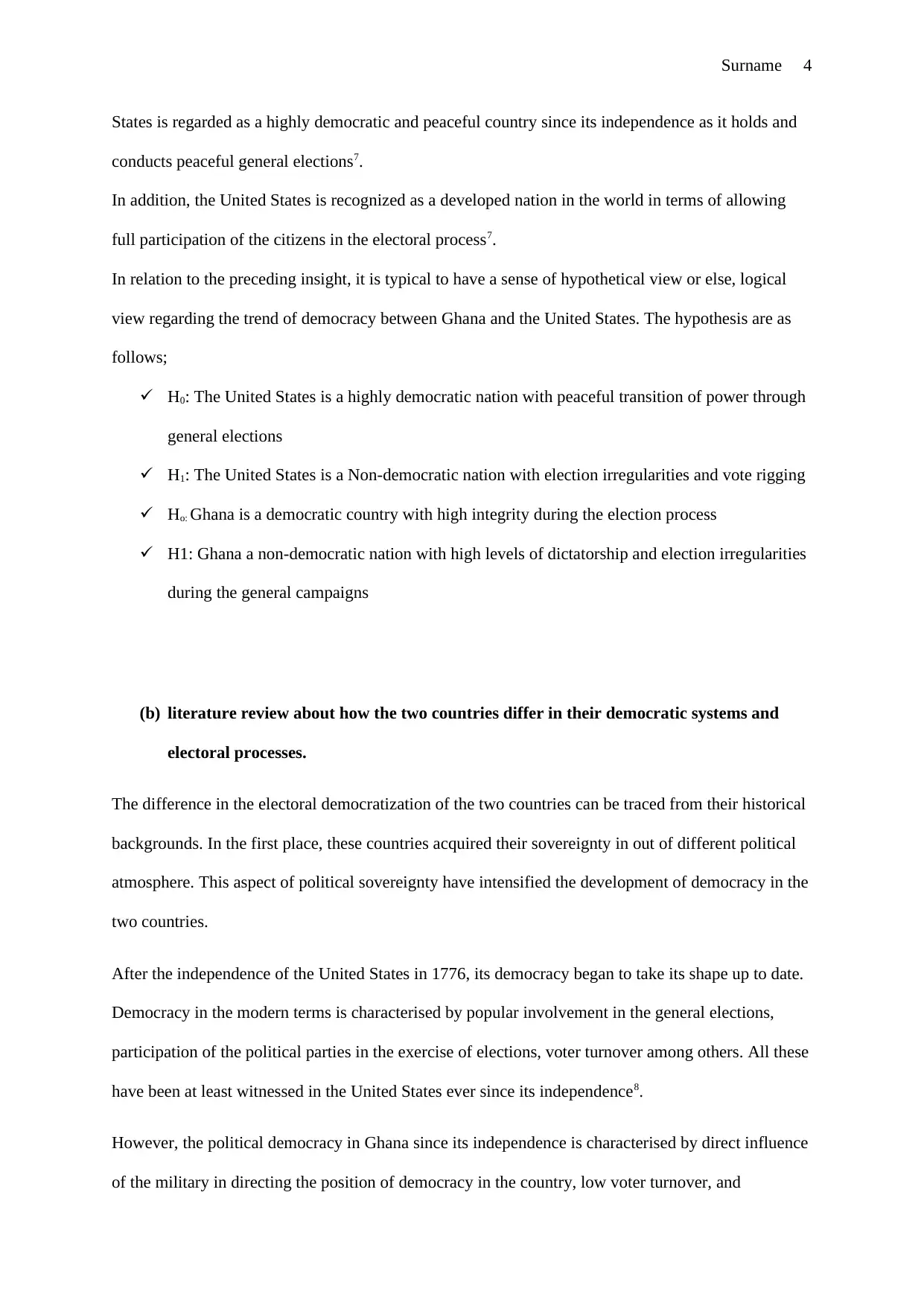
Surname 4
States is regarded as a highly democratic and peaceful country since its independence as it holds and
conducts peaceful general elections7.
In addition, the United States is recognized as a developed nation in the world in terms of allowing
full participation of the citizens in the electoral process7.
In relation to the preceding insight, it is typical to have a sense of hypothetical view or else, logical
view regarding the trend of democracy between Ghana and the United States. The hypothesis are as
follows;
H0: The United States is a highly democratic nation with peaceful transition of power through
general elections
H1: The United States is a Non-democratic nation with election irregularities and vote rigging
Ho: Ghana is a democratic country with high integrity during the election process
H1: Ghana a non-democratic nation with high levels of dictatorship and election irregularities
during the general campaigns
(b) literature review about how the two countries differ in their democratic systems and
electoral processes.
The difference in the electoral democratization of the two countries can be traced from their historical
backgrounds. In the first place, these countries acquired their sovereignty in out of different political
atmosphere. This aspect of political sovereignty have intensified the development of democracy in the
two countries.
After the independence of the United States in 1776, its democracy began to take its shape up to date.
Democracy in the modern terms is characterised by popular involvement in the general elections,
participation of the political parties in the exercise of elections, voter turnover among others. All these
have been at least witnessed in the United States ever since its independence8.
However, the political democracy in Ghana since its independence is characterised by direct influence
of the military in directing the position of democracy in the country, low voter turnover, and
States is regarded as a highly democratic and peaceful country since its independence as it holds and
conducts peaceful general elections7.
In addition, the United States is recognized as a developed nation in the world in terms of allowing
full participation of the citizens in the electoral process7.
In relation to the preceding insight, it is typical to have a sense of hypothetical view or else, logical
view regarding the trend of democracy between Ghana and the United States. The hypothesis are as
follows;
H0: The United States is a highly democratic nation with peaceful transition of power through
general elections
H1: The United States is a Non-democratic nation with election irregularities and vote rigging
Ho: Ghana is a democratic country with high integrity during the election process
H1: Ghana a non-democratic nation with high levels of dictatorship and election irregularities
during the general campaigns
(b) literature review about how the two countries differ in their democratic systems and
electoral processes.
The difference in the electoral democratization of the two countries can be traced from their historical
backgrounds. In the first place, these countries acquired their sovereignty in out of different political
atmosphere. This aspect of political sovereignty have intensified the development of democracy in the
two countries.
After the independence of the United States in 1776, its democracy began to take its shape up to date.
Democracy in the modern terms is characterised by popular involvement in the general elections,
participation of the political parties in the exercise of elections, voter turnover among others. All these
have been at least witnessed in the United States ever since its independence8.
However, the political democracy in Ghana since its independence is characterised by direct influence
of the military in directing the position of democracy in the country, low voter turnover, and
Paraphrase This Document
Need a fresh take? Get an instant paraphrase of this document with our AI Paraphraser
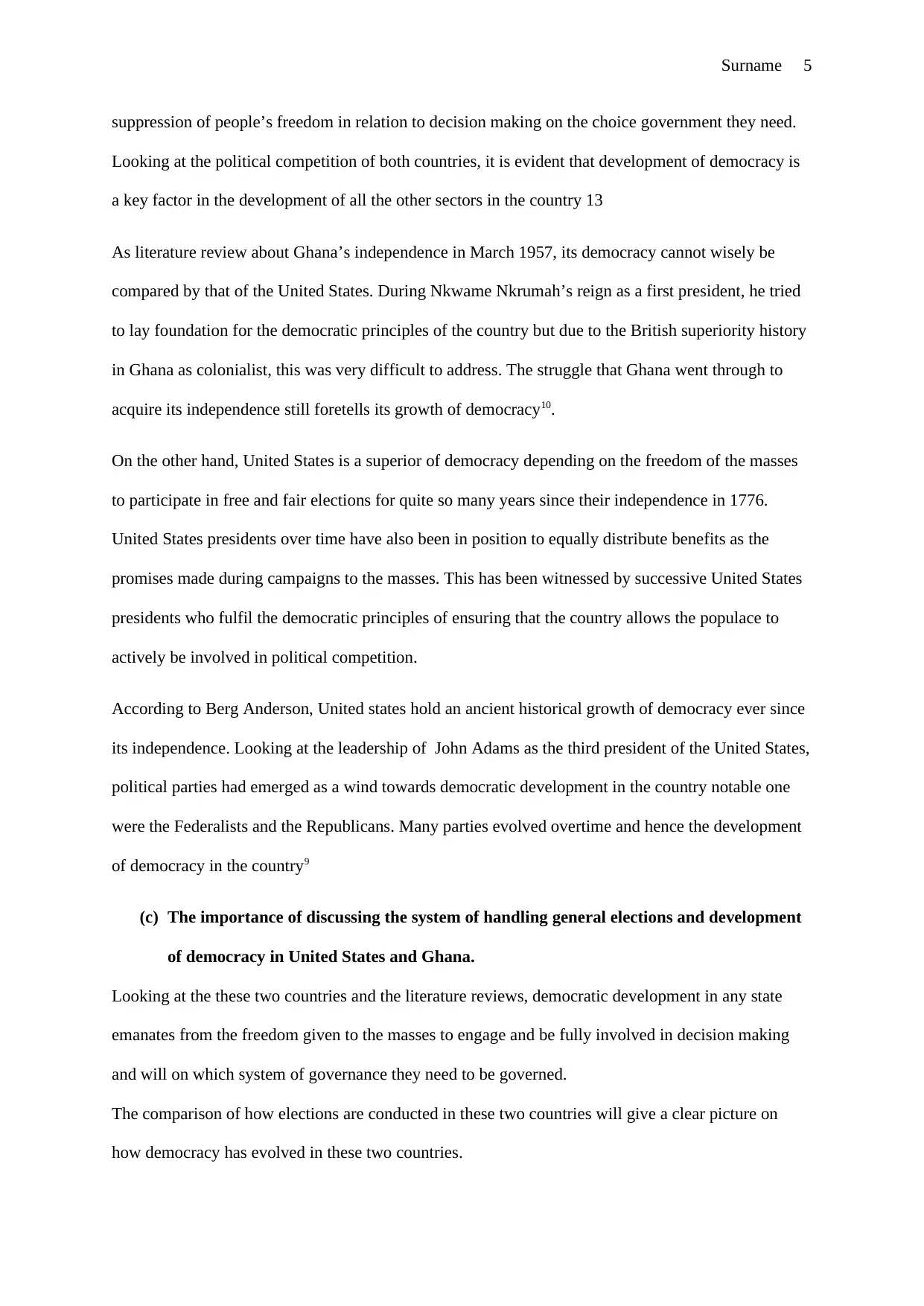
Surname 5
suppression of people’s freedom in relation to decision making on the choice government they need.
Looking at the political competition of both countries, it is evident that development of democracy is
a key factor in the development of all the other sectors in the country 13
As literature review about Ghana’s independence in March 1957, its democracy cannot wisely be
compared by that of the United States. During Nkwame Nkrumah’s reign as a first president, he tried
to lay foundation for the democratic principles of the country but due to the British superiority history
in Ghana as colonialist, this was very difficult to address. The struggle that Ghana went through to
acquire its independence still foretells its growth of democracy10.
On the other hand, United States is a superior of democracy depending on the freedom of the masses
to participate in free and fair elections for quite so many years since their independence in 1776.
United States presidents over time have also been in position to equally distribute benefits as the
promises made during campaigns to the masses. This has been witnessed by successive United States
presidents who fulfil the democratic principles of ensuring that the country allows the populace to
actively be involved in political competition.
According to Berg Anderson, United states hold an ancient historical growth of democracy ever since
its independence. Looking at the leadership of John Adams as the third president of the United States,
political parties had emerged as a wind towards democratic development in the country notable one
were the Federalists and the Republicans. Many parties evolved overtime and hence the development
of democracy in the country9
(c) The importance of discussing the system of handling general elections and development
of democracy in United States and Ghana.
Looking at the these two countries and the literature reviews, democratic development in any state
emanates from the freedom given to the masses to engage and be fully involved in decision making
and will on which system of governance they need to be governed.
The comparison of how elections are conducted in these two countries will give a clear picture on
how democracy has evolved in these two countries.
suppression of people’s freedom in relation to decision making on the choice government they need.
Looking at the political competition of both countries, it is evident that development of democracy is
a key factor in the development of all the other sectors in the country 13
As literature review about Ghana’s independence in March 1957, its democracy cannot wisely be
compared by that of the United States. During Nkwame Nkrumah’s reign as a first president, he tried
to lay foundation for the democratic principles of the country but due to the British superiority history
in Ghana as colonialist, this was very difficult to address. The struggle that Ghana went through to
acquire its independence still foretells its growth of democracy10.
On the other hand, United States is a superior of democracy depending on the freedom of the masses
to participate in free and fair elections for quite so many years since their independence in 1776.
United States presidents over time have also been in position to equally distribute benefits as the
promises made during campaigns to the masses. This has been witnessed by successive United States
presidents who fulfil the democratic principles of ensuring that the country allows the populace to
actively be involved in political competition.
According to Berg Anderson, United states hold an ancient historical growth of democracy ever since
its independence. Looking at the leadership of John Adams as the third president of the United States,
political parties had emerged as a wind towards democratic development in the country notable one
were the Federalists and the Republicans. Many parties evolved overtime and hence the development
of democracy in the country9
(c) The importance of discussing the system of handling general elections and development
of democracy in United States and Ghana.
Looking at the these two countries and the literature reviews, democratic development in any state
emanates from the freedom given to the masses to engage and be fully involved in decision making
and will on which system of governance they need to be governed.
The comparison of how elections are conducted in these two countries will give a clear picture on
how democracy has evolved in these two countries.
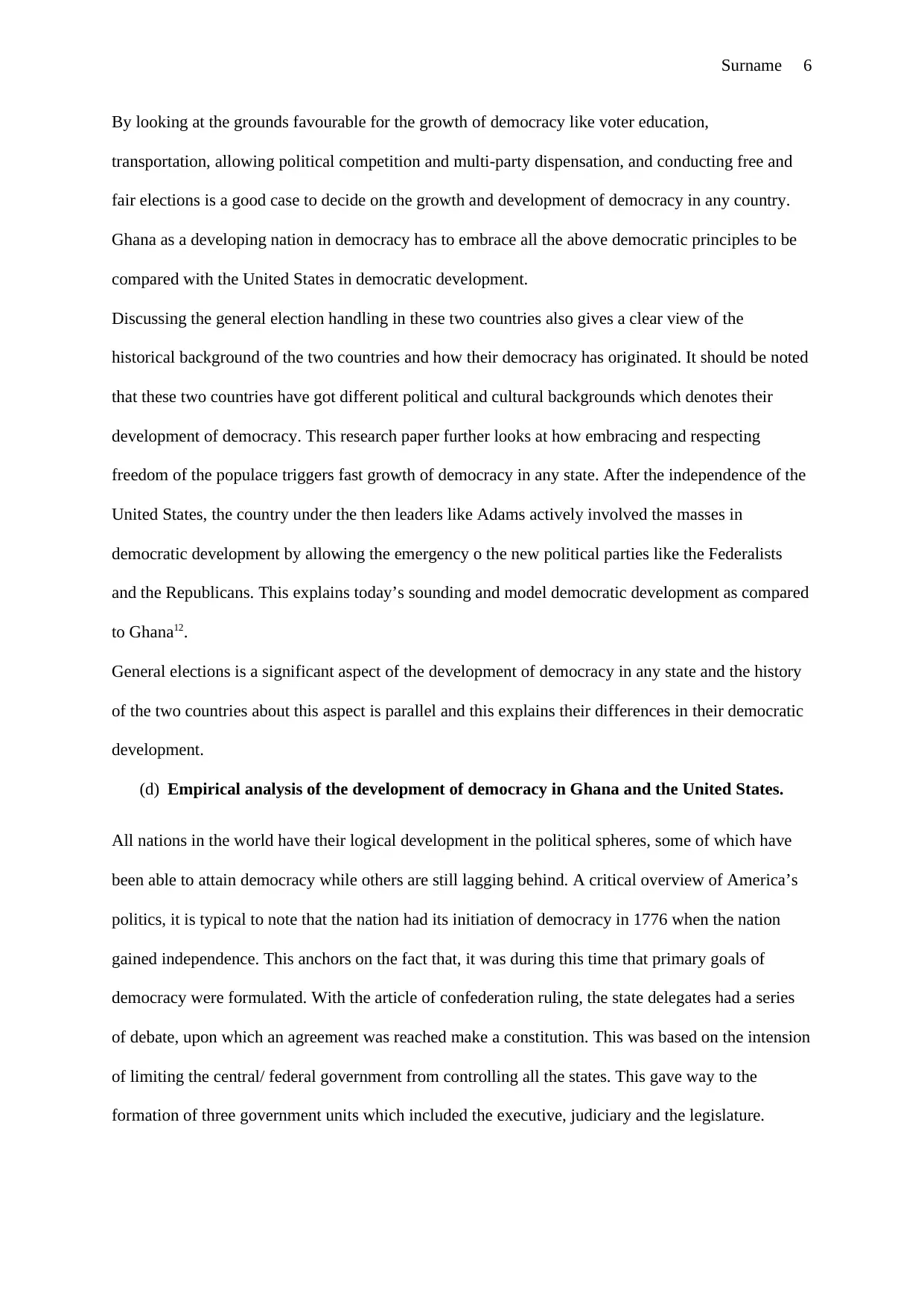
Surname 6
By looking at the grounds favourable for the growth of democracy like voter education,
transportation, allowing political competition and multi-party dispensation, and conducting free and
fair elections is a good case to decide on the growth and development of democracy in any country.
Ghana as a developing nation in democracy has to embrace all the above democratic principles to be
compared with the United States in democratic development.
Discussing the general election handling in these two countries also gives a clear view of the
historical background of the two countries and how their democracy has originated. It should be noted
that these two countries have got different political and cultural backgrounds which denotes their
development of democracy. This research paper further looks at how embracing and respecting
freedom of the populace triggers fast growth of democracy in any state. After the independence of the
United States, the country under the then leaders like Adams actively involved the masses in
democratic development by allowing the emergency o the new political parties like the Federalists
and the Republicans. This explains today’s sounding and model democratic development as compared
to Ghana12.
General elections is a significant aspect of the development of democracy in any state and the history
of the two countries about this aspect is parallel and this explains their differences in their democratic
development.
(d) Empirical analysis of the development of democracy in Ghana and the United States.
All nations in the world have their logical development in the political spheres, some of which have
been able to attain democracy while others are still lagging behind. A critical overview of America’s
politics, it is typical to note that the nation had its initiation of democracy in 1776 when the nation
gained independence. This anchors on the fact that, it was during this time that primary goals of
democracy were formulated. With the article of confederation ruling, the state delegates had a series
of debate, upon which an agreement was reached make a constitution. This was based on the intension
of limiting the central/ federal government from controlling all the states. This gave way to the
formation of three government units which included the executive, judiciary and the legislature.
By looking at the grounds favourable for the growth of democracy like voter education,
transportation, allowing political competition and multi-party dispensation, and conducting free and
fair elections is a good case to decide on the growth and development of democracy in any country.
Ghana as a developing nation in democracy has to embrace all the above democratic principles to be
compared with the United States in democratic development.
Discussing the general election handling in these two countries also gives a clear view of the
historical background of the two countries and how their democracy has originated. It should be noted
that these two countries have got different political and cultural backgrounds which denotes their
development of democracy. This research paper further looks at how embracing and respecting
freedom of the populace triggers fast growth of democracy in any state. After the independence of the
United States, the country under the then leaders like Adams actively involved the masses in
democratic development by allowing the emergency o the new political parties like the Federalists
and the Republicans. This explains today’s sounding and model democratic development as compared
to Ghana12.
General elections is a significant aspect of the development of democracy in any state and the history
of the two countries about this aspect is parallel and this explains their differences in their democratic
development.
(d) Empirical analysis of the development of democracy in Ghana and the United States.
All nations in the world have their logical development in the political spheres, some of which have
been able to attain democracy while others are still lagging behind. A critical overview of America’s
politics, it is typical to note that the nation had its initiation of democracy in 1776 when the nation
gained independence. This anchors on the fact that, it was during this time that primary goals of
democracy were formulated. With the article of confederation ruling, the state delegates had a series
of debate, upon which an agreement was reached make a constitution. This was based on the intension
of limiting the central/ federal government from controlling all the states. This gave way to the
formation of three government units which included the executive, judiciary and the legislature.
⊘ This is a preview!⊘
Do you want full access?
Subscribe today to unlock all pages.

Trusted by 1+ million students worldwide
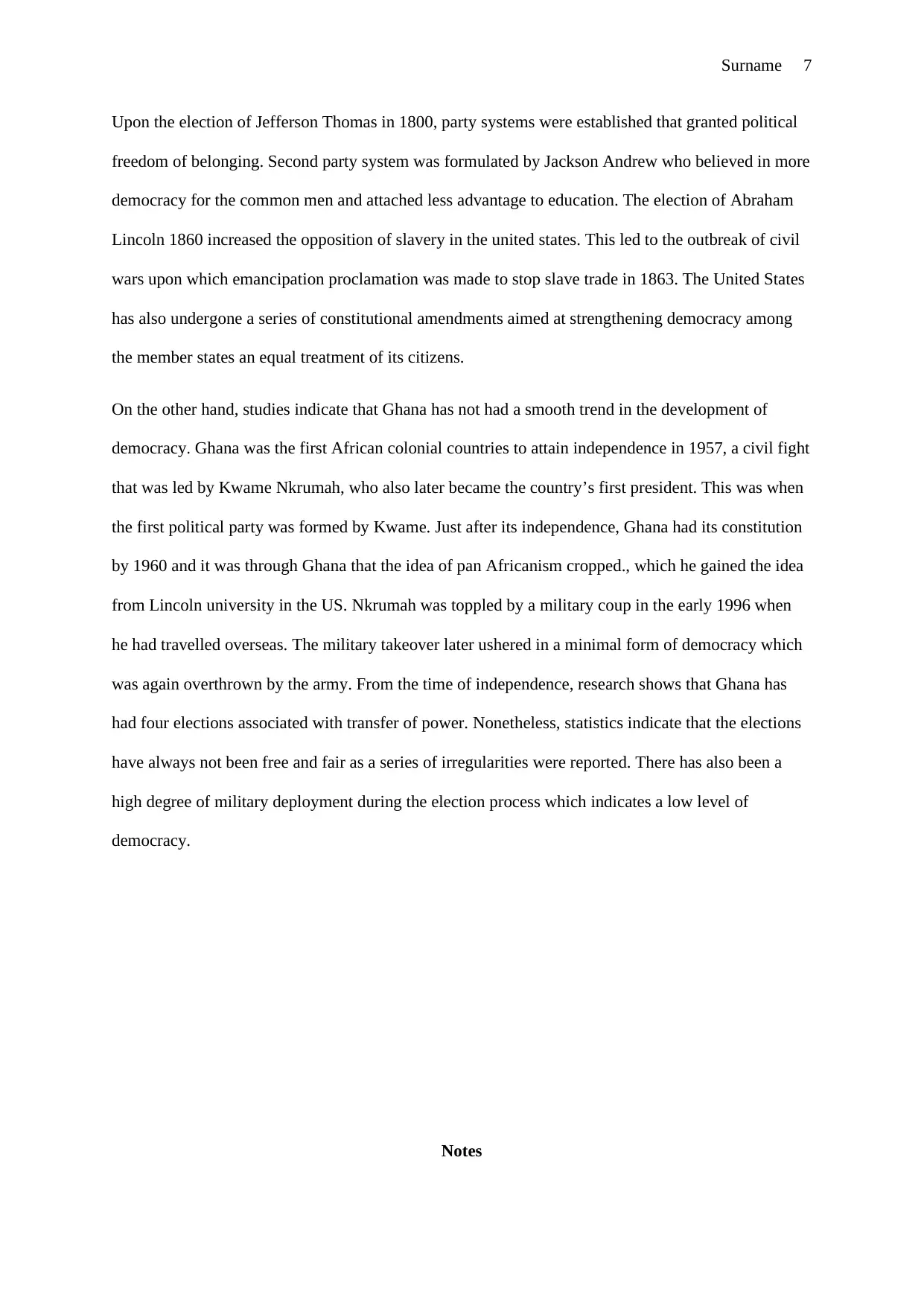
Surname 7
Upon the election of Jefferson Thomas in 1800, party systems were established that granted political
freedom of belonging. Second party system was formulated by Jackson Andrew who believed in more
democracy for the common men and attached less advantage to education. The election of Abraham
Lincoln 1860 increased the opposition of slavery in the united states. This led to the outbreak of civil
wars upon which emancipation proclamation was made to stop slave trade in 1863. The United States
has also undergone a series of constitutional amendments aimed at strengthening democracy among
the member states an equal treatment of its citizens.
On the other hand, studies indicate that Ghana has not had a smooth trend in the development of
democracy. Ghana was the first African colonial countries to attain independence in 1957, a civil fight
that was led by Kwame Nkrumah, who also later became the country’s first president. This was when
the first political party was formed by Kwame. Just after its independence, Ghana had its constitution
by 1960 and it was through Ghana that the idea of pan Africanism cropped., which he gained the idea
from Lincoln university in the US. Nkrumah was toppled by a military coup in the early 1996 when
he had travelled overseas. The military takeover later ushered in a minimal form of democracy which
was again overthrown by the army. From the time of independence, research shows that Ghana has
had four elections associated with transfer of power. Nonetheless, statistics indicate that the elections
have always not been free and fair as a series of irregularities were reported. There has also been a
high degree of military deployment during the election process which indicates a low level of
democracy.
Notes
Upon the election of Jefferson Thomas in 1800, party systems were established that granted political
freedom of belonging. Second party system was formulated by Jackson Andrew who believed in more
democracy for the common men and attached less advantage to education. The election of Abraham
Lincoln 1860 increased the opposition of slavery in the united states. This led to the outbreak of civil
wars upon which emancipation proclamation was made to stop slave trade in 1863. The United States
has also undergone a series of constitutional amendments aimed at strengthening democracy among
the member states an equal treatment of its citizens.
On the other hand, studies indicate that Ghana has not had a smooth trend in the development of
democracy. Ghana was the first African colonial countries to attain independence in 1957, a civil fight
that was led by Kwame Nkrumah, who also later became the country’s first president. This was when
the first political party was formed by Kwame. Just after its independence, Ghana had its constitution
by 1960 and it was through Ghana that the idea of pan Africanism cropped., which he gained the idea
from Lincoln university in the US. Nkrumah was toppled by a military coup in the early 1996 when
he had travelled overseas. The military takeover later ushered in a minimal form of democracy which
was again overthrown by the army. From the time of independence, research shows that Ghana has
had four elections associated with transfer of power. Nonetheless, statistics indicate that the elections
have always not been free and fair as a series of irregularities were reported. There has also been a
high degree of military deployment during the election process which indicates a low level of
democracy.
Notes
Paraphrase This Document
Need a fresh take? Get an instant paraphrase of this document with our AI Paraphraser
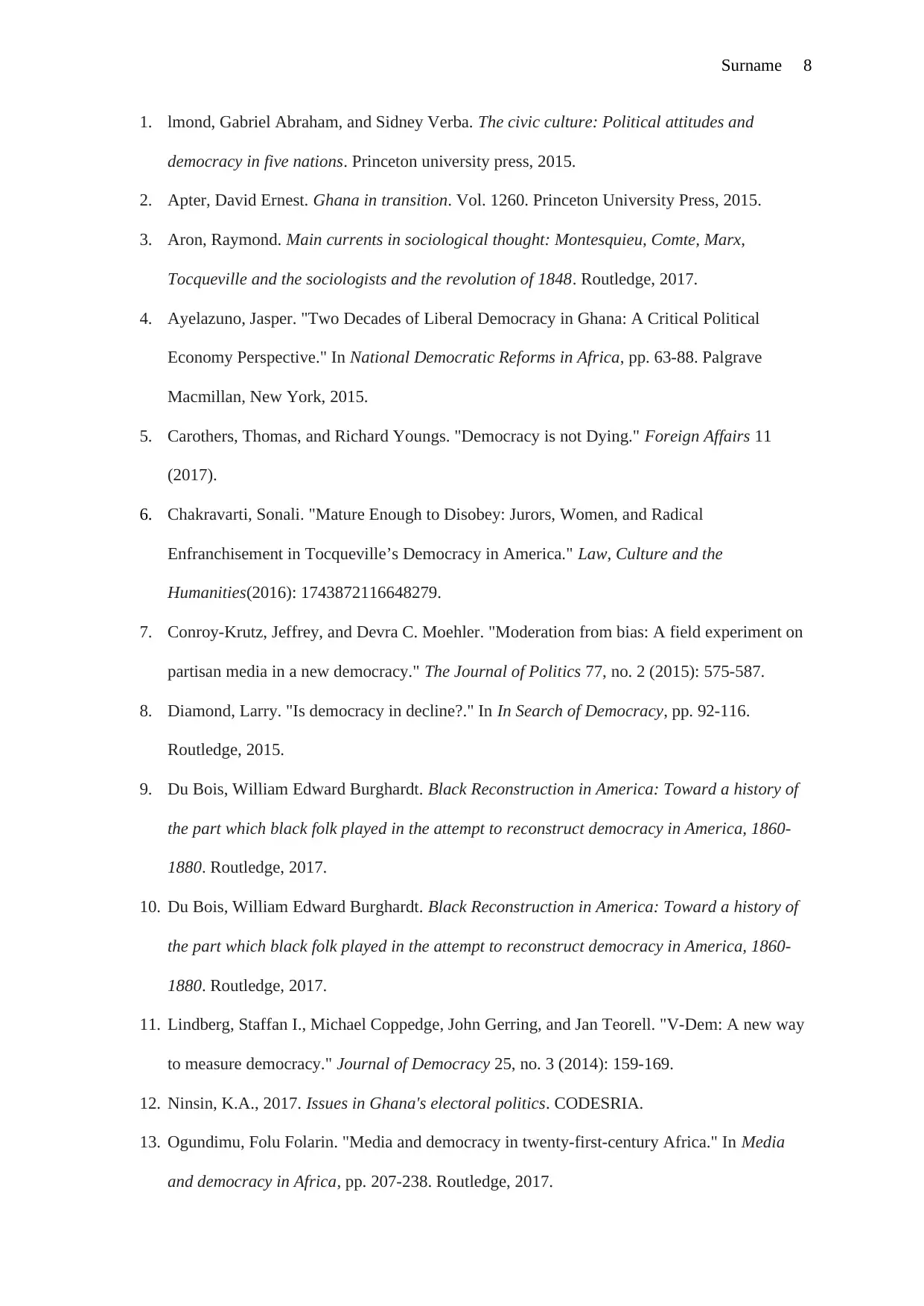
Surname 8
1. lmond, Gabriel Abraham, and Sidney Verba. The civic culture: Political attitudes and
democracy in five nations. Princeton university press, 2015.
2. Apter, David Ernest. Ghana in transition. Vol. 1260. Princeton University Press, 2015.
3. Aron, Raymond. Main currents in sociological thought: Montesquieu, Comte, Marx,
Tocqueville and the sociologists and the revolution of 1848. Routledge, 2017.
4. Ayelazuno, Jasper. "Two Decades of Liberal Democracy in Ghana: A Critical Political
Economy Perspective." In National Democratic Reforms in Africa, pp. 63-88. Palgrave
Macmillan, New York, 2015.
5. Carothers, Thomas, and Richard Youngs. "Democracy is not Dying." Foreign Affairs 11
(2017).
6. Chakravarti, Sonali. "Mature Enough to Disobey: Jurors, Women, and Radical
Enfranchisement in Tocqueville’s Democracy in America." Law, Culture and the
Humanities(2016): 1743872116648279.
7. Conroy-Krutz, Jeffrey, and Devra C. Moehler. "Moderation from bias: A field experiment on
partisan media in a new democracy." The Journal of Politics 77, no. 2 (2015): 575-587.
8. Diamond, Larry. "Is democracy in decline?." In In Search of Democracy, pp. 92-116.
Routledge, 2015.
9. Du Bois, William Edward Burghardt. Black Reconstruction in America: Toward a history of
the part which black folk played in the attempt to reconstruct democracy in America, 1860-
1880. Routledge, 2017.
10. Du Bois, William Edward Burghardt. Black Reconstruction in America: Toward a history of
the part which black folk played in the attempt to reconstruct democracy in America, 1860-
1880. Routledge, 2017.
11. Lindberg, Staffan I., Michael Coppedge, John Gerring, and Jan Teorell. "V-Dem: A new way
to measure democracy." Journal of Democracy 25, no. 3 (2014): 159-169.
12. Ninsin, K.A., 2017. Issues in Ghana's electoral politics. CODESRIA.
13. Ogundimu, Folu Folarin. "Media and democracy in twenty-first-century Africa." In Media
and democracy in Africa, pp. 207-238. Routledge, 2017.
1. lmond, Gabriel Abraham, and Sidney Verba. The civic culture: Political attitudes and
democracy in five nations. Princeton university press, 2015.
2. Apter, David Ernest. Ghana in transition. Vol. 1260. Princeton University Press, 2015.
3. Aron, Raymond. Main currents in sociological thought: Montesquieu, Comte, Marx,
Tocqueville and the sociologists and the revolution of 1848. Routledge, 2017.
4. Ayelazuno, Jasper. "Two Decades of Liberal Democracy in Ghana: A Critical Political
Economy Perspective." In National Democratic Reforms in Africa, pp. 63-88. Palgrave
Macmillan, New York, 2015.
5. Carothers, Thomas, and Richard Youngs. "Democracy is not Dying." Foreign Affairs 11
(2017).
6. Chakravarti, Sonali. "Mature Enough to Disobey: Jurors, Women, and Radical
Enfranchisement in Tocqueville’s Democracy in America." Law, Culture and the
Humanities(2016): 1743872116648279.
7. Conroy-Krutz, Jeffrey, and Devra C. Moehler. "Moderation from bias: A field experiment on
partisan media in a new democracy." The Journal of Politics 77, no. 2 (2015): 575-587.
8. Diamond, Larry. "Is democracy in decline?." In In Search of Democracy, pp. 92-116.
Routledge, 2015.
9. Du Bois, William Edward Burghardt. Black Reconstruction in America: Toward a history of
the part which black folk played in the attempt to reconstruct democracy in America, 1860-
1880. Routledge, 2017.
10. Du Bois, William Edward Burghardt. Black Reconstruction in America: Toward a history of
the part which black folk played in the attempt to reconstruct democracy in America, 1860-
1880. Routledge, 2017.
11. Lindberg, Staffan I., Michael Coppedge, John Gerring, and Jan Teorell. "V-Dem: A new way
to measure democracy." Journal of Democracy 25, no. 3 (2014): 159-169.
12. Ninsin, K.A., 2017. Issues in Ghana's electoral politics. CODESRIA.
13. Ogundimu, Folu Folarin. "Media and democracy in twenty-first-century Africa." In Media
and democracy in Africa, pp. 207-238. Routledge, 2017.

Surname 9
⊘ This is a preview!⊘
Do you want full access?
Subscribe today to unlock all pages.

Trusted by 1+ million students worldwide
1 out of 9
Related Documents
Your All-in-One AI-Powered Toolkit for Academic Success.
+13062052269
info@desklib.com
Available 24*7 on WhatsApp / Email
![[object Object]](/_next/static/media/star-bottom.7253800d.svg)
Unlock your academic potential
Copyright © 2020–2026 A2Z Services. All Rights Reserved. Developed and managed by ZUCOL.





